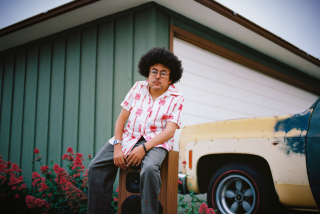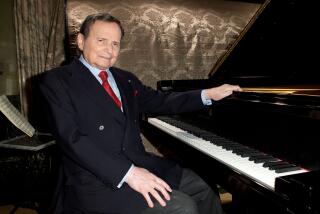Sam Rivers dies at 88; pioneering jazz saxophonist, composer
Sam Rivers, a saxophonist and composer who helped define the avant-garde jazz scene in the 1960s and ‘70s, died of pneumonia Monday in Orlando, Fla. He was 88.
Rivers, whose legacy is defined by both his pioneering spirit in the post-bop jazz scene and a style that married unfettered creativity with a strong foundation of technical ability on a range of instruments, had lived in Orlando since the early 1990s.
The son of church-choir musicians who toured with a gospel group, Rivers was born in 1923 in El Reno, Okla., and reared in Chicago and Little Rock, Ark.
He started piano lessons as a child and later played trombone before settling on the tenor saxophone. Though tenor sax was his primary instrument, he also recorded on flute and piano.
Taking inspiration from jazz heroes such as Coleman Hawkins, among others, he moved to Boston in the late 1940s after serving in the Navy.
Rivers studied at the Boston Conservatory of Music and Boston University, and performed with Herb Pomeroy’s big band, an ensemble that also included future music producer Quincy Jones. In 1964, he moved to New York, where he was hired by Miles Davis.
As his reputation spread, Rivers played with a diverse array of musicians ranging from jazz icons Dizzy Gillespie and Cecil Taylor to blues musicians T-Bone Walker and John Lee Hooker.
“People couldn’t quite figure out where I was coming from,” Rivers told jazz writer Don Heckman for a 2003 Times profile. “When I came to New York, I was playing with Miles Davis. Then I went with Cecil Taylor, and everybody seemed to think that was what I did. Then, later, when I went with Dizzy Gillespie, they said, ‘What is Sam Rivers the avant-gardist doing with Dizzy?’ But I think I really benefited from the different things I did. I’m one of the few players who felt comfortable about crossing back and forth.”
In the 1970s, Rivers’ makeshift loft venue, Studio Rivbea (where he lived with his late wife, Beatrice), became the hub of the avant-garde jazz scene in Lower Manhattan. He also released his own recordings, including “Fuchsia Swing Song.”
When he relocated to Orlando, he was invited by a number of notable musicians working at Walt Disney World to take part in a booming jazz scene. Until September, Rivers held weekly open auditions for his Rivbea Orchestra at Orlando’s musicians’ union hall.
“Music was his life, music is what kept him alive,” said his daughter Monique Rivers Williams, who also handled her father’s concert bookings. “My father, in my eyes, was on vacation all his life. He used to tell me, ‘I’m working, but I’m loving every minute of it.’ Retirement was not in his vocabulary. ‘Why do we even have that word,’ he used to ask me, ‘there should be no such thing.’ ”
Rivers’ wife, Bea, died in 2005. In addition to his daughter Monique, he is survived by two other daughters, Cindy Johnson and Traci Tozzi; a son, Dr. Samuel Rivers III; five grandchildren; and several great-grandchildren.
More to Read
Start your day right
Sign up for Essential California for the L.A. Times biggest news, features and recommendations in your inbox six days a week.
You may occasionally receive promotional content from the Los Angeles Times.




















































